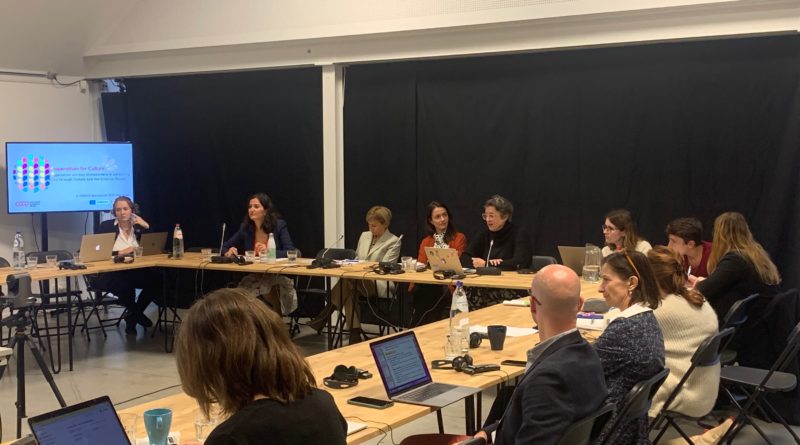Mondiacult 2022 side event: The role of cooperatives in education, culture and the creative sector
5 October 2022
Last 26 September, CICOPA participated in the side event “Cooperatives are Key Stakeholders in advancing SDGs through Culture and the Creative Sector” organized by ICA in the context of the UNESCO Mondiacult 2022 Conference.
On the 26 of September, the International Cooperative Alliance co-organized, together with CICOPA and Cooperatives of the Americas, a side-event as part of the UNESCO World Conference on Cultural Policies and Sustainable Development – Mondiacult 2022. The event titled “Cooperatives are Key Stakeholders in advancing SDGs through Culture and the Creative Sector” was hosted in Brussels (Belgium), in San Jose (Costa Rica), and digitally on Zoom.
The event was a great showcase of both the involvement of cooperatives in the cultural sectors as well as the cultural significance of the cooperative movement’s heritage. In 2016, for instance, the idea and practice of organizing shared interests in cooperatives was inscribed in the UNESCO Representative List of the Intangible Cultural Heritage of Humanity. Several members of CICOPA participated in the event.
At the beginning of the event, the President of CECOP, Giuseppe Guerini, made an introductory speech focused on the link between the cooperative movement from the past, present, and future. He also brought up the support the cooperative model can provide to independent workers.
“Social cooperatives are the solution to overcome loneliness for independent workers. There is no freedom without identity and cooperatives can provide that identity”. Said Guerini.
Diana Dovgan, Secretary General of CICOPA and CECOP, moderated the first panel discussion of the day on “Cooperatives and in/tangible cultural heritage”. Providing examples from Fiji, Kyrgyzstan, Germany, Morocco, and Italy, the panel conveyed how workers have preserved cultural practices and the production of cultural goods by working together and creating cooperatives.
The second panel on “Cooperatives in the cultural and creative sector”, was moderated by President of CICOPA, Iñigo Albizuri Landazabal, saw the participation of CICOPA members Doc Servizi from Italy and Smart Belgium. The discussions centered on the added value the cooperative model provides to these two sectors, especially in comparison to their capitalistic alternatives. For example, Smart shared their experience with the support they could provide to artists and creators during the COVID-19 pandemic and the trans-sectorial solidarity that the multistakeholder cooperative provides. Doc Servizi highlighted the importance of better working conditions and the ownership given to artists by the cooperative model, especially concerning the risks of exploitation of intellectual rights.
The Organization of Brazilian Cooperatives (OCB) was the last CICOPA member to participate in the panel entitled “Institutional efforts in promoting Principle 5 to safeguard cooperative culture”. In their presentation, OCB focused on the cooperative education they provide with the aim to perpetuate the model in Brazil. Their efforts target cooperative members, decision makers and general members of society that are not especially aware of the cooperative movement. OCB does so by providing courses varying from cooperative leadership, taxation and accounting to the basics of the cooperative movement and how to start it up from scratch.
CICOPA thanks the other co-organizers, ICA and Cooperatives of the Americas, and all involved partners for a successful event in terms of organization, quality of the discussions and the panels. The event was an opportunity to strengthen the connection between UNESCO and the cooperative movement.
Access the full report of the event by the ICA by following this link.

